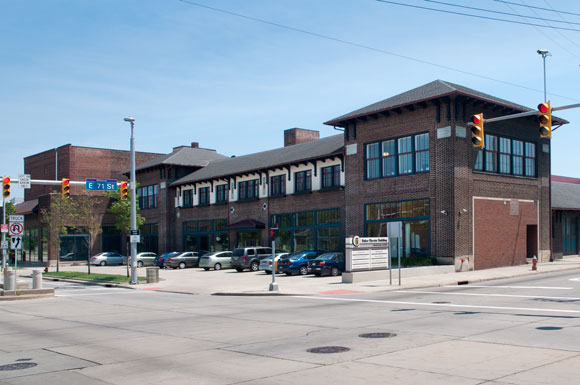British firm partners with CWRU to combat HIV drug resistance, opens hub in Health-Tech Corridor
Population Genetics Technologies (PGT), a Cambridge, UK-based biotech company that develops tests for infectious disease diagnostic tests, has chosen CWRU’s Miguel Quiñones-Mateu, assistant professor in the department of pathology and scientific director of the University Hospitals Translational Laboratory, to help develop diagnostic tests to determine HIV drug resistance for use in clinical management of HIV positive patients.
PGT leadership was so impressed with Cleveland’s support of early stage businesses, in particular from BioEnterprise, that they decided to open its U.S. operations hub in the Baker Electric Building in the Health-Tech Corridor. The offices will be used to support the development and commercialization of the company’s portfolio of advanced diagnostic and testing kits for infectious diseases. PGT plans to create 10 to 20 new jobs in Cleveland over the next two to three years.
“As I learned more about the expertise that exists in Ohio, in Cleveland, it became clear this is where we should grow our business and take out products to market,” says Alan Schafter, CEO of PGT, who is originally from Los Angeles. "There’s a fantastic support network for early stage businesses.”
Over time, HIV patients develop resistance to different treatments and medication must be changed. “These tests are an important management tool because HIV is a chronic infection that is never quite cleared from the blood," explains Schafer. “The virus mutates very rapidly every few years and their bodies develop resistance. We need to [develop] tests so physicians have much better information about which drugs to prescribe.”
PGT developed its tests based on proprietary technology, called VeriTag, which enhances the sensitivity of Next Generation Sequencing (NGS). While NGS allows for precise detections of disease resistance mutations, VeriTag detects mutations at even more precise level, making patient care and drug choices much easier and effective.
Schafer says PGT chose Quiñones-Mateu because of his reputation and work in understanding drug resistant viruses, including transmission and pathogenicity studies. “Miguel Quinones-Mateu is one of the world leaders in this area, really at the forefront, so we knew that he would be the best person to work with,” says Schafer. “We had enthusiastic discussions of what we could each bring to the table and it worked out to be a perfect fit. We’ll be working together in close collaboration.”
While places like Boston and San Diego typically come to mind in the biotech world, Schafer sees Cleveland as having advantages over the coasts. “You’ve got all the pieces and there’s a feeling of growing and a feeling of a biotech ecosystem,” he says. “I can come with my little company and feel like I can attract good people to work in the lab.”



